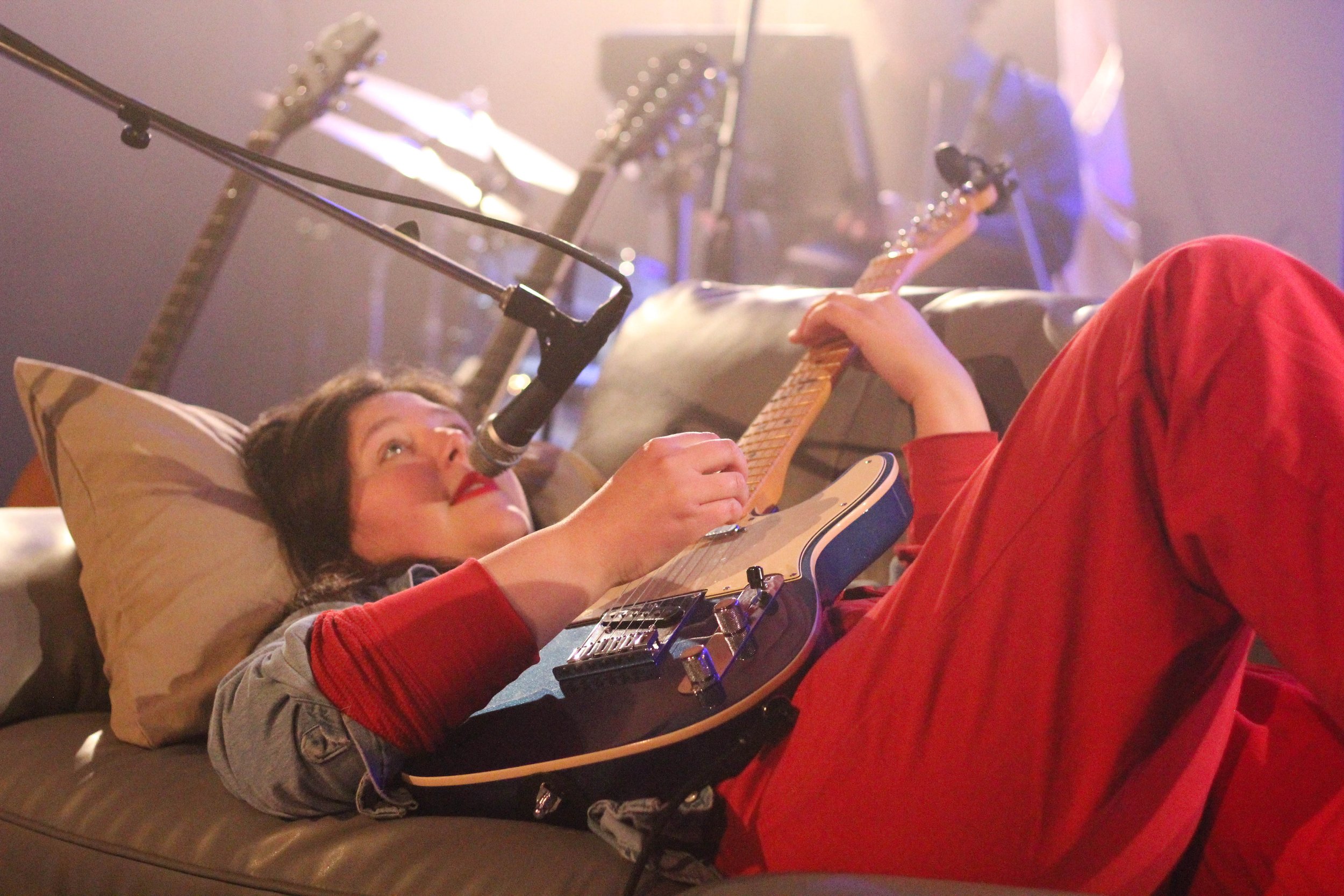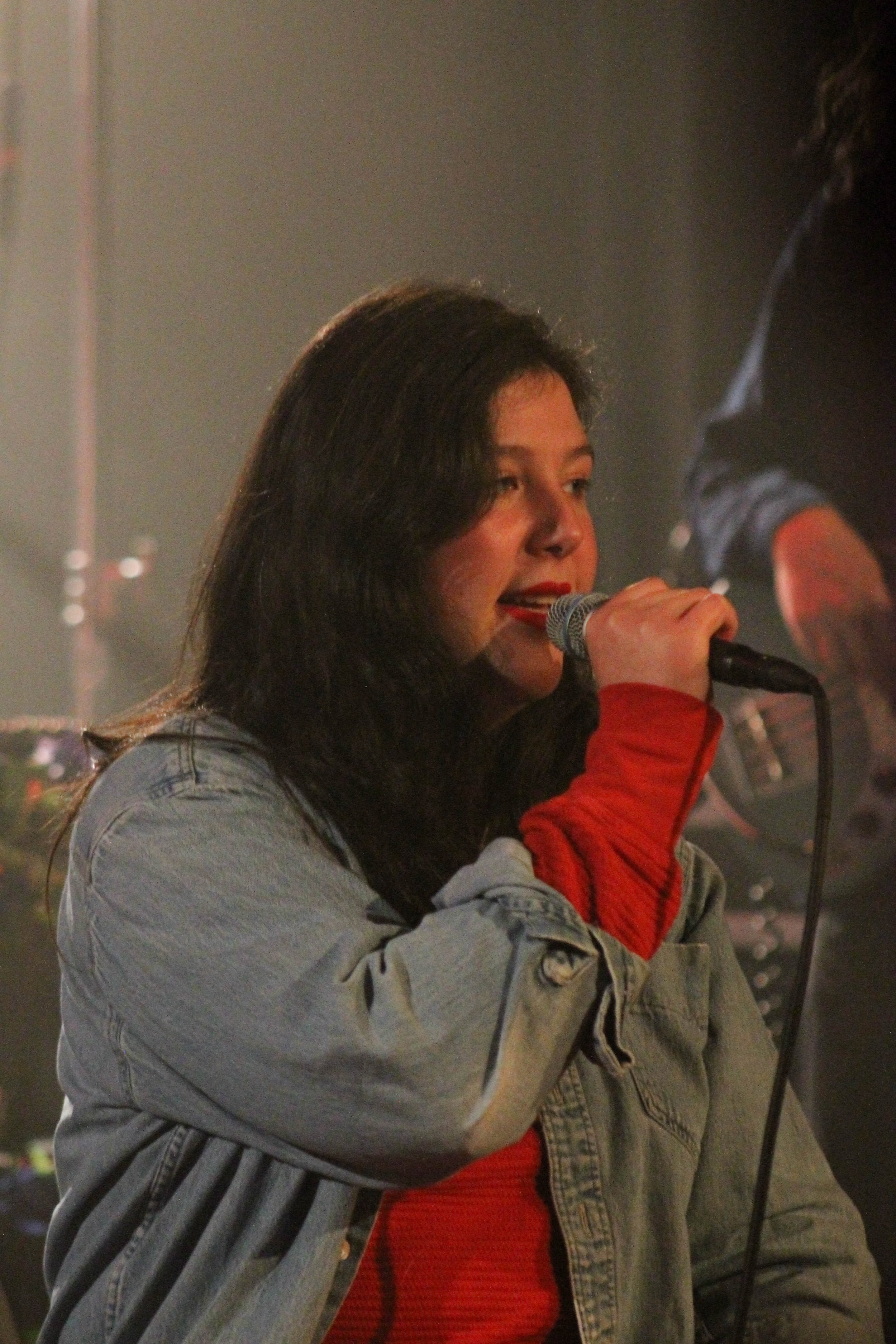By Declan Langton ’22
Editor-in-Chief
Photo courtesy of Ali Meizels
Dressed in a jean jacket and bright red jumpsuit, singer-songwriter Lucy Dacus took to the Gateway City Arts stage on March 1 as a part of her spring “couch tour.” Rather than postpone the last portion of her North American tour due to two herniated discs, Dacus came up with a solution — bring a couch on stage and lay down while singing.
At Gateway City Arts, Dacus continued the tour for her third album “Home Video” (2021). The show’s setup took place in front of a stream of home videos from Dacus’s own collection. On a screen behind the stage, clips played of her being held by her mother, performing in a school choir and showing off a scenic view in a rocky desert. Before the drums and mics were set up, two members of the stage crew carried out Dacus’s couch. As they placed it at the center of the stage, the crew was met by applause — and some chuckling — from members of the crowd.
The room grew hot as the audience filed in during the opener, which featured addy, a musing folk rock band led by Adam Watkins, who, like Dacus, got their start in the Richmond, Virginia music scene.
Laying on her couch bordered with a fake ivy vine, Dacus opened the show with “Triple Dog Dare,” the nearly eight minute album closer from “Home Video.” The song tells the dramatized story of a childhood friendship that borders on something more. “Triple Dog Dare” ends hauntingly, with the two girls running away together and later becoming missing “milk carton kids — ” their faces plastered on the side of the beverage’s container. During this song, and the others she sang from the couch, Dacus’s voice seemingly emerged from nowhere. Her body was invisible to the majority of the crowd, blocked by those standing in the first few rows. Despite this, her sonic presence was dominating.
Zoe Fieldman ’22, who attended the show, commented on this arrangement.
“At first, I felt frustrated at not being able to see her. I had known she was injured, and expected the couch performance, but thought they would loft the sofa so that the audience might have a better view. This was not the case,” Fieldman explained. “However, I was incredibly impressed by their use of animation to supplement not being able to see the performer.”
Projected on the wall behind Dacus and her band were animations created specifically for each song. As she performed her song “Cartwheel” — about a childhood friend-turned-crush — the graphic featured children on a swing set, fireflies, a crescent moon and dark trees, mirroring the nostalgia of both the song and all of “Home Video.”
“The animations were captivating and beautiful in addition to giving my eyes something to focus on without it distracting too much from the music itself. They also really captured the recurring themes of childhood, growing up,” Fieldman observed.
At first, Dacus’s concealment seemingly caused a disconnect in the show. Two completely separate experiences were present in the room: one for those in the front row — nearly face to face with Dacus — and the rest of the room, who became reliant on the reactions of those sitting in the first row.
Lucy James-Olson ’22, who attended the show alongside Fieldman, appreciated the setup, even if it was initially strange to adapt to.
“It actually was kind of fun to not be able to see [Dacus] for the majority of the time — it encouraged me … to get immersed in the music and close my eyes and really listen, which was cool,” James-Olson said.
Dacus’s lyrics are crafted, nostalgic storytelling, featuring vivid characters from friends to lovers to fathers. In her elegant voice, she flirts with inherent sadness and solitude, even when performing in front of a crowd humming and singing her words back toward the stage.
Her song “Thumbs,” which Dacus released in two versions, is one of these songs built around characters. In the lyrics, Dacus tells the story of a dinner which she attends alongside her friend and her friend’s absent father. The twist: Dacus hates the father so violently that she spends a verse discussing how she would like to press her thumbs into his eyes “until they burst,” she sings. On March 1, she performed an alternate version of this song called “Thumbs Again” which came out a few months after the original version on “Home Video.” “Thumbs Again” replaces the droning synths of “Thumbs” with a pulsing, darker beat, adding layers to the frightening song, seemingly giving strength to the narrator.
Photo courtesy of Ali Meizels
Despite limited visibility from the couch, Dacus continually addressed the members of the crowd she couldn’t see. “Hello, people I can’t see from my couch,” she said, the first time she sat up. Later, referencing the standing room only venue layout, she said, “I feel like I should stand more.”
Stand more she did. Dacus’ March 1 performance was the first time she stood for three songs since injuring her back in early February. One of those songs was “Going Going Gone,” which she structured like a sing-along for the crowd. “Going gone, going going gone,” she sang along with members of the audience.
Dacus’s setlist also featured well-known songs from her previous albums. From the 2016 album “No Burden,” Dacus delivered her song “I Don’t Wanna Be Funny Anymore.”
“I wrote that when I was a teen,” Dacus told the crowd, smirking.
From her second album, “Historian,” Dacus played “Yours & Mine” and “Addictions.” For “Addictions,” Dacus grabbed a guitar, playing it while continuing to lay on the couch — something you may expect to see in a living room kickback but was an exciting surprise at Gateway City Arts.
“Yours & Mine” stunned Fieldman when Dacus performed it at the show.
“I have not been able to stop listening to Yours & Mine since hearing it live. The performance was amazing and now it is one of my favorite songs,” Fieldman said.
“Night Shift,” the “Historian” opening track and one of Dacus’ most well-known songs, served as the show’s closer. The breakup ballad turned rock anthem is by far her most streamed song, amassing over 42 million streams on Spotify.
With “Night Shift,” the energy at Gateway City Arts seemed to adjust. Members of the crowd moved closer to the stage and threw their hands into the air, dancing. Voices of those singing along started to become more clear, but Dacus’ powerful swell was never eclipsed as she led the room to the end of the night.
Before leaving the stage, Dacus said, “This is a cool job, thank you for letting me have it.”


